Fleurs du Mal Magazine


Or see the index
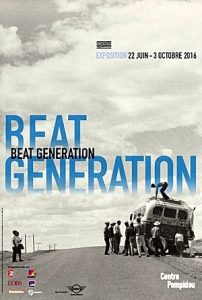 Beat Generation
Beat Generation
Until 3 October 2016
The Centre Pompidou is to present Beat Generation, a novel retrospective dedicated to the literary and artistic movement born in the late 1940s that would exert an ever-growing influence for the next two decades. The theme will be reflected in all the Centre’s activities, with a rich programme of events devised in collaboration with the Bibliothèque Public d’Information and Ircam: readings, concerts, discussions, film screenings, a colloquium, a young people’s programme at Studio 13/16, etc.
Foreshadowing the youth culture and the cultural and sexual liberation of the 1960s, the emergence of the Beat Generation in the years following the Second World War, just as the Cold War was setting in, scandalised a puritan and Mc Carthyite America. Then seen as subversive rebels, the Beats appear today as the representatives of one of the most important cultural movements of the 20th century – a movement the Centre Pompidou’s survey will examine in all its breadth and geographical amplitude, from New York to Los Angeles, from Paris to Tangier.
The Centre Pompidou’s exhibition maps both the shifting geographical focus of the movement and its ever-shifting contours. For the artistic practices of the Beat Generation – readings, performances, concerts and films – testify to a breaking down of artistic boundaries and a desire for interdisciplinary collaboration that puts the singularity of the artist into question. Alongside notable visual artists, mostly representative of the California scene (Wallace Berman, Bruce Conner, George Herms, Jay DeFeo, Jess…), an important place is given to the literary dimension of the movement, to spoken poetry in its relationship to jazz, and more particularly to the Black American poetry (LeRoi Jones, Bob Kaufman…) that remains largely unknown in Europe, like the magazines in which it circulated (Beatitude, Umbra…). Photography was also an important medium, represented here by the productions of Allen Ginsberg and William Burroughs – mostly portraits – and a substantial body of photographs by Robert Frank (Les Américains, From the Bus…), Fred McDarrah, and John Cohen, all taken during the shooting of Pull my Daisy, as well as work by Harold Chapman, who chronicled the life of the Beat Hotel in Paris between 1958 and 1963. The same was true of the films (Christopher MacLaine, Bruce Baillie, Stan Brakhage, Ron Rice…) that would both reflect and document the history and development of the movement.
Exhibition at the Centre Pompidou in Paris until October 3, 2016
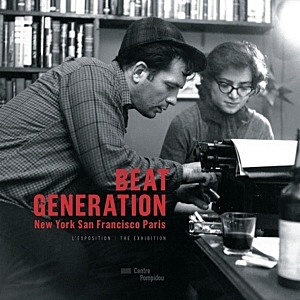 New publication:
New publication:
Beat generation – exhibition album
Movement of literary and artistic inspiration born in the United States in the 1950s, at the initiative of William Burroughs, Allen Ginsberg and Jack Kerouac, the Beat Generation has profoundly influenced contemporary creation.
The book displays the different artworks exhibited along with short explanatory essays. A clear and precise album suitable for a large audience.
Bilingual version French / English.
Binding: Softbound
Language: Bilingual French / English
EAN 9782844267467
Number of pages 60
Number of illustrations 60
Publication date 15/06/2016
Dimensions 27 x 27 cm
Author: Philippe-Alain Michaud
Publisher: Centre Pompidou
€9.50
# Information and schedule about the Beat Generation exhibition on website Centre Pompidou
fleursdumal.nl magazine
More in: #Beat Generation Archives, - Book News, Burroughs, William S., DICTIONARY OF IDEAS, DRUGS & DISEASE & MEDICINE & LITERATURE, Ginsberg, Allen, Kerouac, Jack, Literaire sporen, LITERARY MAGAZINES
Literair tijdschrift De Gids bestaat 179 jaar. In die vele jaren heeft De Gids een cruciale bijdrage geleverd aan de Nederlandse letteren. Dat heeft De Gids alleen maar kunnen realiseren door met de tijd mee te bewegen. Elke tijd vraagt immers om een andere aanpak, een andere vorm.
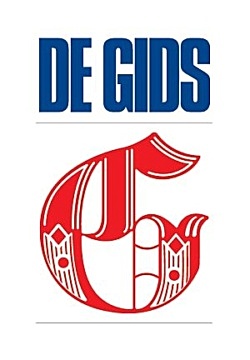 Enkele jaren geleden is de subsidie aan literaire tijdschriften stopgezet. Om die reden is De Gids een alliantie aangegaan met De Groene Amsterdammer. Behalve aan de eigen abonnees wordt De Gids toegestuurd aan abonnees van De Groene. Daardoor is de oplage van De Gids tot boven de 20.000 gestegen, voor een literair tijdschrift ongekend. Zo weet De Gids een hoge kwaliteit te combineren met een groot publieksbereik. Dat is het antwoord van De Gids op wat deze tijd vraagt.
Enkele jaren geleden is de subsidie aan literaire tijdschriften stopgezet. Om die reden is De Gids een alliantie aangegaan met De Groene Amsterdammer. Behalve aan de eigen abonnees wordt De Gids toegestuurd aan abonnees van De Groene. Daardoor is de oplage van De Gids tot boven de 20.000 gestegen, voor een literair tijdschrift ongekend. Zo weet De Gids een hoge kwaliteit te combineren met een groot publieksbereik. Dat is het antwoord van De Gids op wat deze tijd vraagt.
De Gids geniet ruimhartige ondersteuning van De Groene Amsterdammer. Maar ook de middelen van De Groene Amsterdammer zijn niet onbeperkt. Het is daarom zaak dat De Gids zijn positie verstevigt. Verhoging van het aantal eigen abonnees is cruciaal. Alleen met voldoende Gids-abonnees is zijn toekomst gegarandeerd.
Misschien heeft u nog geen abonnement op De Gids. In dat geval zijn er goede redenen er wel een te nemen. Dan krijgt u zes keer per jaar de beste verhalen, gedichten en literaire essays van de Lage Landen toegestuurd en draagt u tegelijk bij aan de vitaliteit van het oudste, spannendste en meest gezaghebbende literaire tijdschrift van Nederland. Dit is geen grootspraak. Zoals in de voorafgaande 179 jaar publiceren de beste Nederlandstalige schrijvers en dichters in De Gids. In de afgelopen paar nummers waren dat onder andere Maarten Asscher, Maria Barnas, Hans Maarten van den Brink, Adriaan van Dis, Rob van Essen, Piet Gerbrandy, Micha Hamel, Kees ’t Hart, Mensje van Keulen, Yves Petry, Nina Polak, Annelies Verbeke, Dirk van Weelden en Niña Weijers.
# meer informatie over literair tijdschrift De Gids
fleursdumal.nl magazine
More in: - Book Lovers, Art & Literature News, LITERARY MAGAZINES, PRESS & PUBLISHING
Symposium
The Battle for Europe
What kind of Europe do we want?
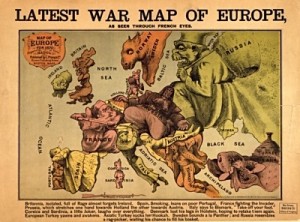 Dutch citizens vote in a consultative referendum on the Association Agreement between the European Union and the Ukraine on April 6. The discussion is heated. In Brussels, the EU keeps a close eye on the outcome in the Dutch referendum. At stake is not only a trade union and closer cooperation between these two parties, but also the relations between member states within the EU. Is this referendum not actually a turning point, a battle for the future of Europe?
Dutch citizens vote in a consultative referendum on the Association Agreement between the European Union and the Ukraine on April 6. The discussion is heated. In Brussels, the EU keeps a close eye on the outcome in the Dutch referendum. At stake is not only a trade union and closer cooperation between these two parties, but also the relations between member states within the EU. Is this referendum not actually a turning point, a battle for the future of Europe?
Opponents of the treaty with Ukraine consider it an undemocratic attempt to increase the power of the EU. In their eyes, the EU is a bureaucratic monster that gradually threatens the sovereignty of its member states while simultaneously robbing them. They turn their backs to the EU, reject the transfer of sovereign power to Brussels and withdraw behind clearly defined national boundaries. Proponents of the agreement emphasize the need to stand together within Europe in order to ensure security, stability and economic prosperity for all European citizens. Without dismissing the need for questioning the current EU, they still see it as the best way to reinforce European cooperation and values such as peace, civil rights, solidarity and prosperity – values that must be accessible to everyone.
Where do Europe’s borders actually lie? Are these borders geographically, historically or culturally defined? Is further expansion of the EU necessary, and what is the role of America and Russia? ‘The Battle for Europe’ presents a lively debate between euro critics and euro lovers, between supporters and opponents of rapprochement with Ukraine and allows you to discuss with thinkers and politicians of international standing about the fundamental problem underlying the Dutch Referendum: What kind of Europe do we want?
Symposium
The Battle for Europe
What kind of Europe do we want?
2 April 2016
15.00 – 17.00
DeLaMar Theater Amsterdam
Speakers
Harry van Bommel, politician
Pavlo Klimkin, Minister of Foreign Affairs of Ukraine
Ivan Krastev, political scientist
John Laughland, investigative journalist
Peter Pomerantsev, Russia specialist
Ivan Vejvoda, expert of European integration
Entrance tickets
– Normal ticket € 10
– Nexus Friend tickets are free (max. 2 pp)
The Battle for Europe
Nexus-symposium 2016
# More info on website NEXUS
fleursdumal.nl magazine
More in: Art & Literature News, DICTIONARY OF IDEAS, LITERARY MAGAZINES, Magazines, Nexus Instituut
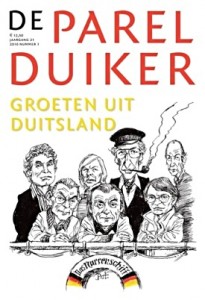
Kom naar de feestelijke Parelduikermiddag aan het begin van de Boekenweek, in het Theater van het Woord van de OBA te Amsterdam (7e etage).
Thema: Duitsland.
M.m.v. Els Snick, Hans Olink, Ton Naaijkens, Guido Groenland en Daan Boertien.
Els Snick reisde door Duitsland, praatte met vluchtelingen, volgde het spoor van Joseph Roth en dook in haar eigen familieverleden. Haar boek, Duitsland op het spoor (Uitgeverij Bas Lubberhuizen), wordt ten doop gehouden.
Hans Olink, die regelmatig in Berlijn verblijft, volgt in de Duitse hoofdstad het spoor van Nederlandse en Duitse kunstenaars en politici, van mensen die de geschiedenis vorm gaven. Zijn boek, Berlijn, Berlin. In het spoor van de geschiedenis (Uitg. Prominent), verschijnt eveneens die dag.
Ton Naaijkens, hoogleraar Duitse letterkunde en Vertaalwetenschap aan de Universiteit Utrecht, draagt Duitse poëzie in vertaling voor.
Guido Groenland (tenor) en Daan Boertien (piano) verluchtigen het programma met Duitse muziek uit de twintigste eeuw (Brecht/Weill en Eisler).
TOEGANG VRIJ!
12 maart 2016: Parelduikermiddag in de OBA
# Meer info op website van De Parelduiker
fleursdumal.nl magazine
More in: Art & Literature News, Galerie Deutschland, Joseph Roth, LITERARY MAGAZINES, The talk of the town
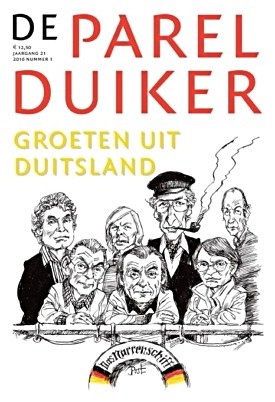 De Parelduiker 2016/1
De Parelduiker 2016/1
‘Groeten uit Duitsland’
Een literaire Rijnreis
Zet 70 schrijvers op een boot en laat ze 5 dagen lang een tocht van Bazel naar Rotterdam over de Rijn maken, dan zal de literatuur vanzelf gaan stromen. Dat dachten de organisatoren van het ‘internationaal literair experiment’ Das Narrenschiff in juni 1984 schrijvers. Een van de Nederlandse auteurs, Bob den Uyl, vond de gedachte ‘onzin’. Maar hij ging wel, net als Harry Mulisch, Remco Campert, Gerrit Kouwenaar, J. Bernlef, C. Buddingh’, Louis Ferron en Jan Eijkelboom. Buddingh’-biograaf Wim Huijser beschrijft de tocht van dit Narrenschip en z’n steeds ongemakkelijker wordende opvarenden.
Nederlandse en Vlaamse schrijvers in Duitsland, 1940-1942
Na de machtsovername door Hitler in 1933 bleven Nederlandse en Vlaamse schrijvers Duitsland bezoeken.
In Weimar werden onder auspiciën van de nazi’s jaarlijks literaire bijeenkomsten gehouden voor schrijvers, boekhandelaren en uitgevers. Rintsje Sybesma, Henri Bruning, Jan H. Eekhout en dr. Jan de Vries kwamen op uitnodiging en voor Vlaanderen kwamen Felix Timmermans, Ernest Claes, Filip de Pillecyn, Wies Moens en Ferdinand Vercnocke.
Tussen goed en kwaad
Stijn Streuvels werd tijdens en na de Tweede Wereldoorlog enige Duitsgezindheid verweten. Goede vriend Antoon Coolen vroeg Streuvels daar na de bevrijding in een merkwaardig-harde brief opheldering over. Zelf was Coolen tijdens de bezetting heel duidelijk anti-Duits geweest en had hij acties ondernomen die hem en zijn familie in gevaar hadden gebracht. Streuvels gaf een klaar antwoord op dit requisitoir van Coolen.
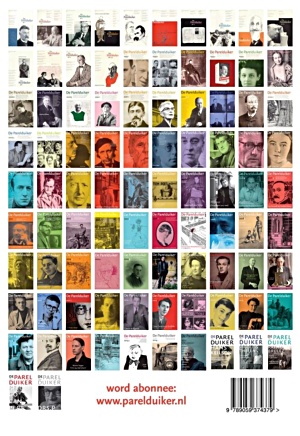 De Parelduiker
De Parelduiker
De Parelduiker is een tijdschrift over schrijvers en literatuur. Op een toegankelijke, niet-academische manier doet het verslag van enerverende, vaak amusante speurtochten naar de verborgen schatten van onze literatuurgeschiedenis. Onder het mom van het aan Multatuli ontleende motto ‘Een parelduiker vreest den modder niet’ belichten de medewerkers aan dit blad niet alleen de verborgen zijde van bekende auteurs, maar halen zij ook vergeten schrijvers boven water. De rubrieken ‘Laagwater’, voor de faits divers in de letterkunde, en ‘Seinpost’, waarin vanuit de pleisterplaatsen van literaire auteurs wordt bericht, maken De Parelduiker tot een bij uitstek prettig leesbaar blad, dat bij een groot aantal lezers en literatuurjournalisten gretig aftrek vindt.
De Parelduiker is een uitgave van Uitgeverij Bas Lubberhuizen en wordt financieel ondersteund door het P.O. van Gennep Fonds en de Stichting Vrienden van De Parelduiker
Redactie
De Parelduiker bestaat sinds 1996 en verschijnt vijf keer per jaar. De lay-out is van Piet Gerards, de opmaak wordt uitgevoerd door CeevanWee.
De redactie van De Parelduiker wordt gevormd door Hein Aalders, Marco Daane, Marco Entrop, Marsha Keja, Menno Voskuil en Thijs Wierema.
# Meer info op website van De Parelduiker
• fleursdumal.nl magazine
More in: - Book Lovers, Antoon Coolen, Art & Literature News, Galerie Deutschland, LITERARY MAGAZINES
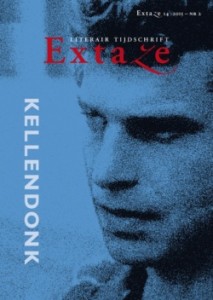 Speciaal themanummer Literair tijdschrift Extaze tijdens het Kellendonk-jaar 2015
Speciaal themanummer Literair tijdschrift Extaze tijdens het Kellendonk-jaar 2015
Ook dit jaar maakt Literair Tijdschrift Extaze weer een bijzonder themanummer.
Vijfentwintig jaar geleden is de Nederlandse schrijver Frans Kellendonk overleden, voor Extaze reden om een apart nummer over zijn leven en schrijverschap te plannen.
Begin april is een crowdfundingactie gestart via website: www.voordekunst.nl
Waarom uw steun nodig is . . .
Het Kellendonk-nummer, zoals dat de redactie van Extaze voor ogen staat, kan niet met de eigen bescheiden middelen gefinancierd worden. De kosten voor het onderzoek, de uitwerking van de stukken, het beeldend werk (waarvoor een gerichte opdracht is gegeven aan Rens Krikhaar, een beeldend kunstenaar te Den Haag wiens stijl verwantschap toont met het werk van Kellendonk), de speciale vormgeving, net als het beeldend werk aangepast aan het onderwerp, de extra drukkosten die de bijzondere vormgeving en het extra aantal pagina’s met zich meebrengen en de ‘anders dan andere’ presentatie, waarvoor sprekers en podiumartiesten gerichte opdrachten krijgen, noodzaken de redactie een beroep op u te doen. (Door dit bericht te delen helpt u ook mee!)
Crowdfundingactie Kellendonk-nummer Extaze
Meer informatie op website Kellendonkfonds: http://kellendonkfonds.nl/
fleursdumal.nl magazine
More in: Art & Literature News, Frans Kellendonk, LITERARY MAGAZINES
Jo Glanville: The Charlie Hebdo principle (PEN director Jo Glanville responds to the withdrawal of six writers from PEN American Center’s annual gala over their decision to honour Charlie Hedbo)
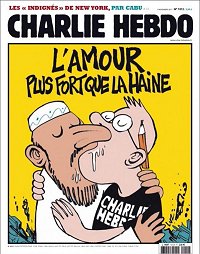 The distaste of eminent writers such as Peter Carey at PEN American Center’s decision to honour Charlie Hebdo at its gala next month, highlights once again the fundamental inconsistency that underpins attitudes towards free speech. Within days of the ‘Je Suis Charlie’ outpouring of solidarity, French police were arresting citizens for glorifying terrorism, while David Cameron’s government was busy pushing a counter terrorism bill through Parliament that would severely curtail universities’ liberty as a forum for freedom of expression. We may be used to the double standards of politicians, but what about writers?
The distaste of eminent writers such as Peter Carey at PEN American Center’s decision to honour Charlie Hebdo at its gala next month, highlights once again the fundamental inconsistency that underpins attitudes towards free speech. Within days of the ‘Je Suis Charlie’ outpouring of solidarity, French police were arresting citizens for glorifying terrorism, while David Cameron’s government was busy pushing a counter terrorism bill through Parliament that would severely curtail universities’ liberty as a forum for freedom of expression. We may be used to the double standards of politicians, but what about writers?
Becoming a member of PEN (one of the oldest human rights organisations in the world, and the largest international community of writers) means pledging ‘to oppose any form of suppression of freedom of expression in the country and community to which [writers] belong, as well as throughout the world wherever this is possible’. That’s a sentiment one would hope any writer might be happy to support and PEN depends, on a regular basis, on its members speaking out and standing up for fellow writers at risk. That’s the source of its influence and moral authority.
One of the writers, Francine Prose, a former PEN President, who decided to withdraw from the gala in protest, was reported as saying that giving an award signified ‘admiration and respect’ for the winner’s work. ‘I couldn’t imagine being in the audience when they have a standing ovation for Charlie Hebdo.’ But Charlie Hebdo is in fact being recognised for its courage: the courage to publish in the face of threats and intimidation, and the courage to continue publishing after the shocking murders in January.
We are more used to seeing that courage at a greater distance – in Mexico, Russia, Bangladesh or Egypt – and feel safe celebrating writers and journalists who may be prosecuted for outraging public morals in their own culture.
On our own doorstep, when faced with a satirical publication that provokes and offends, there is an underlying view implicit in the protest of Peter Carey and fellow writers that this kind of speech is not worth defending. Carey questioned whether it even was a freedom of expression issue; the writer Deborah Eisenberg voiced concerns (as have many others) about Charlie Hebdo’s ‘denigrating portrayals of Muslims’. Yet one of the most important, if uncomfortable, responsibilities for any free speech advocate is to defend the right to express speech which may be shocking, disturbing or offensive. Without that broad defence, the limits of everyone’s speech, as well as writers and publishers, are at risk of being restricted to suit the political agenda or prevailing morality, at a cost to artistic licence as well as individual freedom.
 Most of the great free speech battles in history have been fought over issues that were not deemed deserving of defence. The subjects of the famous obscenity prosecutions of the 70s in the UK (the Oz trial or Linda Lovelace’s memoir) were seen as publications of no merit. But what was at stake, as in the case of Charlie Hebdo, was the principle: the freedom to publish and the freedom to write. A freedom on which all writers depend. Victory in court (in the face of moral outrage) led to greater freedom for publishers and writers. In one of his last interviews, the writer and barrister John Mortimer, who famously defended both the Oz and the Lovelace trials, spoke of the retreat from ‘the abiding principle … that you lived in a country where you could read anything you like’. The growth of the idea that we should at all costs avoid causing offence (and that this may be even more important than defending the right to free speech) continues to undermine that principled protection for freedom of expression.
Most of the great free speech battles in history have been fought over issues that were not deemed deserving of defence. The subjects of the famous obscenity prosecutions of the 70s in the UK (the Oz trial or Linda Lovelace’s memoir) were seen as publications of no merit. But what was at stake, as in the case of Charlie Hebdo, was the principle: the freedom to publish and the freedom to write. A freedom on which all writers depend. Victory in court (in the face of moral outrage) led to greater freedom for publishers and writers. In one of his last interviews, the writer and barrister John Mortimer, who famously defended both the Oz and the Lovelace trials, spoke of the retreat from ‘the abiding principle … that you lived in a country where you could read anything you like’. The growth of the idea that we should at all costs avoid causing offence (and that this may be even more important than defending the right to free speech) continues to undermine that principled protection for freedom of expression.
Salman Rushdie, a notable supporter of English PEN and the PEN American Center, who has excoriated the withdrawal of Carey and others from the gala, was similarly criticised 26 years ago for causing gratuitous offence (by fellow writers) after the fatwa. Roald Dahl even called him a dangerous opportunist. There may be ‘good faith differences of opinion within our community’ as PEN American Center generously acknowledged on Sunday but it’s in the interests of all writers to stand up for the principle.
Jo Glanville is director of English PEN
(This piece first appeared in The Bookseller (28 April 2015). Source: website English PEN)
# More information on website English PEN
fleursdumal.nl magazine
More in: Art & Literature News, LITERARY MAGAZINES, PRESS & PUBLISHING, REPRESSION OF WRITERS, JOURNALISTS & ARTISTS
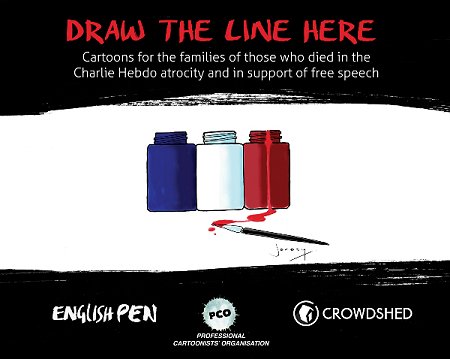
Draw the Line Here: Cartoonists respond to the Charlie Hebdo killings. Cartoons for the families of the victims of the Charlie Hebdo attacks, and in support of free speech.
English PEN is delighted to announce the publication of Draw The Line Here, a collection of cartoons drawn in response to the Charlie Hebdo attacks in Paris in January 2015.
The book is a collaboration between the Professional Cartoonists’ Organisation (PCO), Crowdshed, and English PEN. It features cartoons drawn by British artists in the days immediately after the attacks. The work of 66 cartoonists is featured, including Steve Bell, Dave Brown, Martin Rowson, Peter Brooke and Ralph Steadman.
 Proceeds from the book will be split equally between the fund for the victims of the Charlie Hebdo murders, and English PEN’s Writers at Risk programme.
Proceeds from the book will be split equally between the fund for the victims of the Charlie Hebdo murders, and English PEN’s Writers at Risk programme.
Production of the book was made possible by a crowd-funding campaign launched in February. Over 200 people pledged their support to the project, and will be receiving their copies of the book in the coming days.
Draw The Line Here includes a foreword by Libby Purves, patron of the PCO, who writes:
Some cartoons here are gentle, others savage; some merely encapsulate the bafflement and sadness of a world where mockery is met not with the proper response, a shrug, but with murder. Again and again the theme is of the fragility of the sceptical, laughing pencil: its simplicity and its splendour, the opposite of the vainglorious, meaningless squalor of the gun and the bomb.
Jo Glanville, director of English PEN, said:
We are extremely grateful to the PCO and to Crowdshed for choosing English PEN as a beneficiary of this project, and of course to all the cartoonists who have contributed to the book. By exercising their own right to freedom of expression, these artists are helping to defend the free speech of others.
The publication of this book could not be more timely. Sunday 3 May is World Press Freedom Day, the perfect time to stand in solidarity with Charlie Hebdo.
Draw The Line Here may be purchased online at: www.englishpen.org/campaigns/draw-the-line-here
Supporters to the Crowdfunding campaign will receive their copies in the coming days
Books cost UK £15.00 each. UK delivery is £2.00 and international delivery is £4.00.
# More information on website English PEN
fleursdumal.nl magazine
More in: - Book News, Art & Literature News, LITERARY MAGAZINES, PRESS & PUBLISHING, REPRESSION OF WRITERS, JOURNALISTS & ARTISTS
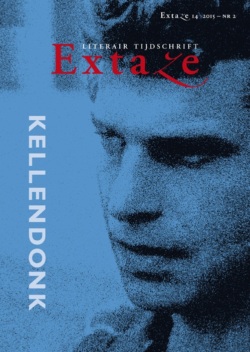 Speciaal themanummer Literair tijdschrift Extaze tijdens het Kellendonk-jaar 2015
Speciaal themanummer Literair tijdschrift Extaze tijdens het Kellendonk-jaar 2015
Ook dit jaar maakt Literair Tijdschrift Extaze weer een bijzonder themanummer. Vijfentwintig jaar geleden is de Nederlandse schrijver Frans Kellendonk overleden, voor Extaze reden om een apart nummer over zijn leven en schrijverschap te plannen. Begin april is een crowdfundingactie gestart via website: www.voordekunst.nl
Het Kellendonk-nummer, zoals dat de redactie van Extaze voor ogen staat, kan niet met de eigen bescheiden middelen gefinancierd worden. De kosten voor het onderzoek, de uitwerking van de stukken, het beeldend werk (waarvoor een gerichte opdracht is gegeven aan Rens Krikhaar, een beeldend kunstenaar te Den Haag wiens stijl verwantschap toont met het werk van Kellendonk), de speciale vormgeving, net als het beeldend werk aangepast aan het onderwerp, de extra drukkosten die de bijzondere vormgeving en het extra aantal pagina’s met zich meebrengen en de ‘anders dan andere’ presentatie, waarvoor sprekers en podiumartiesten gerichte opdrachten krijgen, noodzaken de redactie een beroep op u te doen.
# Meer informatie over Frans Kellendonk op website Kellendonk-fonds
fleursdumal.nl magazine
More in: Art & Literature News, Frans Kellendonk, LITERARY MAGAZINES, PRESS & PUBLISHING
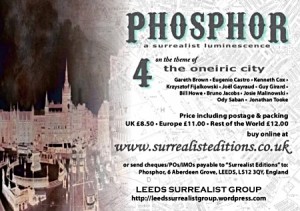 A surrealist luminescence
A surrealist luminescence
Phosphor was launched in 2008, as a substantial, high-quality journal, which has the aim of presenting contemporary creative and critical work by Leeds Surrealist Group and their friends, with essays, poetry, critique, graphic art, photography, reviews, games, enquiries . . .
Although drawing upon Surrealism’s current manifestations, both locally and internationally, Phosphor also highlights sometimes neglected aspects of its history. Each issue has a broad theme, though is not constrained by it. Phosphor followed on from the group’s Manticore/Surrealist Communication, a four-page A3 publication, which ran for eight numbers between 1997 and 2006.
Phosphor No.4 – The Oneiric City
‘We can read the language of the city streets as a dream narrative, to subject it to a form of dream-analysis even, in an attempt to better understand ourselves. But the streets change, as cities are reshaped and our oneiric sites are demolished, so the narratives themselves become like dreams, as if they had only happened while we were asleep and are remembered upon waking.’
– from the editorial, Port of Prague, by Kenneth Cox & Bill Howe
72 pages – B5 format – Spring 2015 – ISSN 1755-0009
Texts, poems, images on the theme of ‘The Oneiric City’ – including:
Kenneth Cox, Dreaming The City By Day – an account of a ludic exploration of the city undertaken by Leeds Surrealist Group
Bruno Jacobs, Notes On The Oneiric City – on the dream-like atmosphere of certain cities
Guy Girard, One City Is Another – on the superimposition of one city onto another
Krzysztof Fijalkowski, Rêvilleros – reveries on Santiago de Compostela, Nantes and Prague
Bill Howe, Into The Desert Of Mirrors And Magnifiers – a subjective commentary on a ludic exploration, ‘Deserts In The City’, of a neutral area of Leeds, followed by individual and collective evidence
Josie Malinowski, Explorations In An Oneiric City – an illustrated account from ‘Deserts In The City’
Gareth Brown, Descent From The Black Plain – an hallucinatory text from ‘Deserts In The City’
Ody Saban, Natural Defenestration – a personal memoir of Istanbul
Jonathan Tooke, Life On Staircases – a tale about a discovered notebook that contains fragments of strange oneiric experiments
Joël Gayraud, Panic Square – a short tale of a disturbing disorientation
poems by Kenneth Cox, Bill Howe, Vangelis Koutalis
images by Jan Drabble, Kathleen Fox, Juan Carlos Otaño, Michael Richardson, Ody Saban, Pierre-André Sauvageot
reviews by Andy Boobier, Gareth Brown, Krzysztof Fijalkowski, Bill Howe, Mike Peters, Michael Richardson
UK £8.50
Europe £11.00
USA & Rest of the World £12.00
Price including postage & packing
# more information on website LEEDS SURREALIST GROUP
fleursdumal.nl magazine
More in: Art & Literature News, LITERARY MAGAZINES, Surrealism, SURREALISM
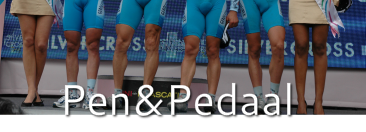
Vijf zomers lang was er GeelZucht, of de Ronde van Frankrijk in wielergedichten. Vijf zomers lang wrong een losvast collectief op de blog geelzucht.weebly.com een inktvers wielergedicht uit lijf en leden, een poëtische impressie van een voorbije Touretappe, nog dezelfde avond gepost.
Vanaf 2015 gooien de auteurs (m/v) (‘met een Groot Wielerhart voor het Jongensboek van de Koers’) het over een andere boeg. Ze spitsen zich niet langer toe op het rondewerk, wel op de voorjaarsklassiekers. GeelZucht wordt voortaan Pen & Pedaal. Vanaf zaterdag 28 februari brengen ze in dichtvorm verslag uit van alle grote wedstrijden die de revue passeren. Het resultaat staat elke avond vanaf 19.00 uur online op de nieuwe blog http://penpedaal.weebly.com/
GeelZucht is niet meer, leve Pen & Pedaal!
Volgende auteurs hebben hun hoogtestage achter de rug en staan al helemaal op scherp om Koppen- en Keutenberg, Steenbeekdries en Drève des Boules d’Hérin, Roche-aux-Faucons en Poggio te bedwingen: Bert Bevers, Frans Brocatus, Philippe Cailliau, Martin Carrette, Patrick Cornillie, Norbert De Beule, Fleur De Meyer, Philippe Hoorne, Albert Megens, Dirk Nachtergaele, Frank Pollet, Paul Rigolle, Lies Van Gasse, Miel Vanstreels en Willie Verhegghe.
Ze brengen – naar de conditie, de tactiek, het geluk en de grinta van de dag – gedichten over de Omloop Het Nieuwsblad, Kuurne-Brussel-Kuurne, de Strade Bianchi, Milaan-Sanremo, Dwars door Vlaanderen, de E3 Prijs Harelbeke, Gent-Wevelgem, Ronde van Vlaanderen, de Scheldeprijs, Parijs-Roubaix, de Brabantse Pijl, de Amstel Gold Race, de Waalse Pijl, Luik-Bastenaken-Luik en jawel, bij wijze van uitwaai ook van Puyvelde Koerse. Te volgen dus op http://penpedaal.weebly.com/
Voor de in koers geïnteresseerde poëzieliefhebber. En omgekeerd.
fleursdumal.nl magazine
More in: Art & Literature News, Bevers, Bert, Literary Events, LITERARY MAGAZINES
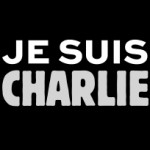 Be part of the movement for peace and tolerance
Be part of the movement for peace and tolerance
Support the project: ‘Draw The Line Here’
Come together in support of Charlie Hebdo and freedom of expression
The tragic events in Paris last week have shaken many of us to the core, but rising from the ashes is a growing global movement in support of freedom of expression and religious tolerance.
To celebrate this and raise much needed funds for the families and victims of the Charlie Hebdo atrocities, the Professional Cartoonists’ Organisation has collaborated with English PEN and CrowdShed to create ‘Draw The Line Here’ (Tracer La Ligne Ici), a specially curated collection of cartoons produced in the days immediately following the Paris attacks.
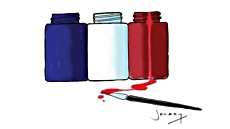 Once production and publishing costs for Draw The Line Here have been covered, half of the proceeds from this crowdfund campaign will go to English PEN, a registered charity working to promote freedom of expression, and the other half will be donated to the fund for the families of the victims.
Once production and publishing costs for Draw The Line Here have been covered, half of the proceeds from this crowdfund campaign will go to English PEN, a registered charity working to promote freedom of expression, and the other half will be donated to the fund for the families of the victims.
Be part of the movement for peace and tolerance
This symbol of the pen being mightier than the gun has inspired us all. Draw The Line Here has been set up to let us all contribute to the creation and publication of a book that celebrates the timeless art so brilliantly presented by Charlie Hebdo, and memorialise those who paid with their lives for what they believed in.
By supporting and funding this project you’ll be supporting and funding English PEN in their vital work to defend and promote freedom of expression around the world and lend much needed aid to the victims’ families.
fleursdumal.nl magazine
More in: Art & Literature News, LITERARY MAGAZINES, PRESS & PUBLISHING, REPRESSION OF WRITERS, JOURNALISTS & ARTISTS
Thank you for reading Fleurs du Mal - magazine for art & literature